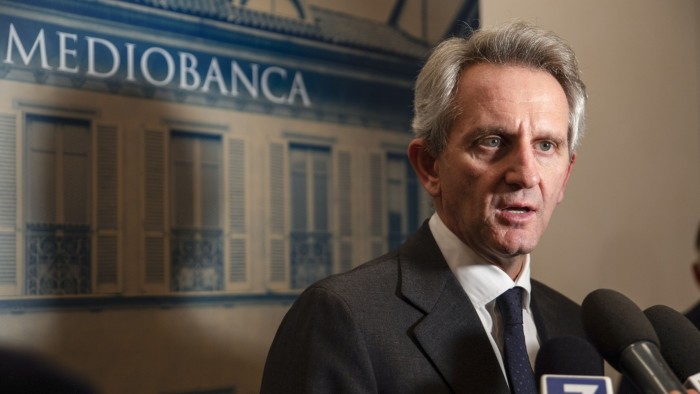Unlock the Editor’s Digest for free
Roula Khalaf, Editor of the FT, selects her favourite stories in this weekly newsletter.
Mediobanca is known for being wily, creative and ruthless on behalf of clients. It is now putting those qualities to good use in its own defence. Having found itself on the receiving end of a hostile bid from Monte dei Paschi di Siena, the Italian investment bank has decided to fight back.
Its tactic: a €6.3bn offer for wealth manager Banca Generali, launched on Monday. Financially, the deal passes muster. Mediobanca forecasts €215mn of cost and funding synergies, the present value of which should cover the modest premium and yield an uptick of between 5 and 10 per cent on Mediobanca’s market value.
That, as it happens, is about the same amount of value creation that Mediobanca might achieve from acceding to Monte dei Paschi’s €14bn offer. The investment bank would emerge with 60 per cent of a combined entity worth perhaps €25bn, including synergies, or about 10 per cent more than the Milanese bank’s market value.
Where Italian financial institutions are concerned, nothing is ever simple. In this case, Mediobanca is proposing to pay for Banca Generali with its own 13 per cent stake in Assicurazioni Generali, the parent group that owns 50 per cent of the wealth manager. Warring shareholders of that company have driven its shares up 40 per cent this year.

Technicalities aside, Mediobanca chief executive Alberto Nagel is laying out a standalone strategy that his shareholders can get behind. Banca Generali would turn Mediobanca into Italy’s very own mini-UBS, getting almost half its revenue from wealth management. That’s not a bad idea given the higher multiples these steady, growing and capital-light businesses command. UBS, for instance, trades at 14 times this year’s earnings, a 30 per cent premium to Mediobanca itself.

The prospect of a livelier valuation may be enough to entice institutional investors and Italian industrialists, who together make up almost 50 per cent of Mediobanca’s shareholder base, to support the deal.
It may even be enough to convince rebel shareholders — Francesco Gaetano Caltagirone and the Luxottica family’s holding company Delfin, which together own about 27 per cent of Mediobanca. What they really seem to want is control of Generali, in which they also own shares. They have tried and failed to add directors to the bank’s board. With Mediobanca out of the picture, Generali becomes a more accessible target next time.
This deal, then, does something to please most of the parties involved. But that doesn’t mean it is guaranteed to succeed. There is still the chance that Banca Generali, now in play, attracts an offer from other interested buyers. Mediobanca, if it really wants to create an Italian counterpart to Swiss wealth giant UBS, may then find it has to dig a little deeper.
https://www.ft.com/content/172a3227-1246-4822-8f7e-0d5eebff17ab


